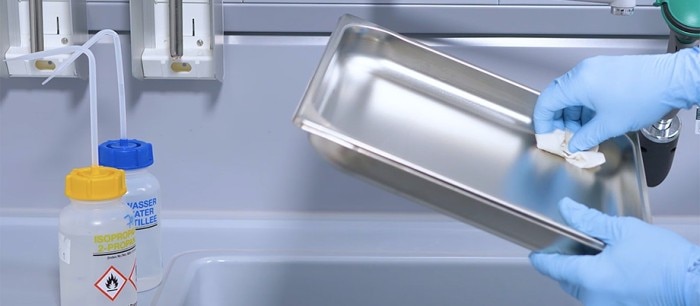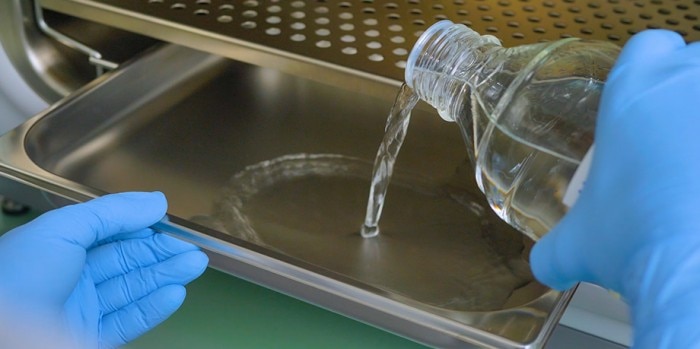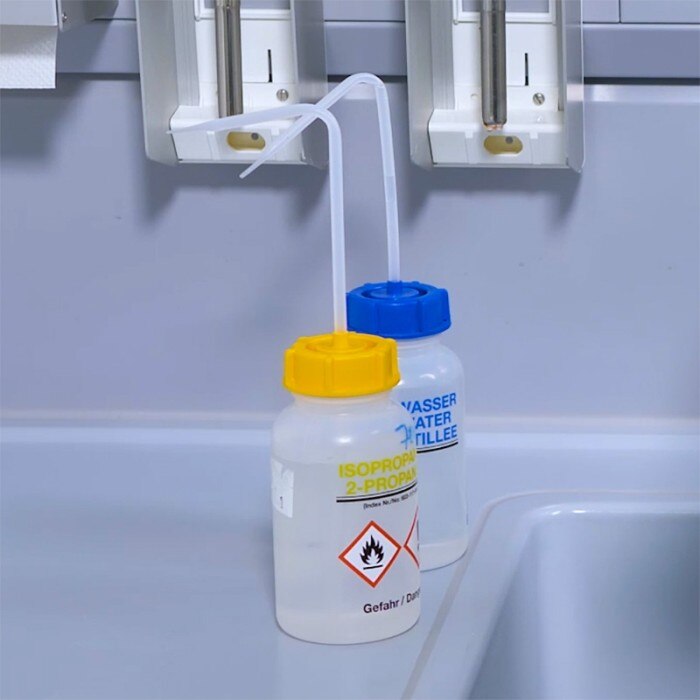MENU
TW | TWD
TW | TWD
You are about to leave this site.
Please be aware that your current cart is not saved yet and cannot be restored on the new site nor when you come back. If you want to save your cart please login in into your account.
No results found
Search Suggestions

CO₂ Incubator FAQs: How to properly clean the removable or integrated humidity tray of your CO₂ incubator?
Lab Academy
- Cell Biology
- Cell Culture
- Stem Cells
- Lab Routine
- Reproducibility
- Contamination
- CO2 Incubators
- FAQ
This article was published first in "Inside Cell Culture" , the monthly newsletter for cell culture professionals. Find more interesting articles about CO2 incubators on our page "FAQs and material on CO2 incubators" .
In this article, we propose a procedure for proper cleaning of removable and integrated/fixed humidity trays according to recommendations of cell culture guidelines.
If you want your water to stay fresh within your drinking bottle, simply refilling it will not be sufficient. From time to time, the bottle requires additional cleaning with a soap solution and manual removal of the biofilm that forms inside. Similarly, simply refilling the humidity tray of your CO₂ incubator may lead to an increased risk of contamination. Therefore, general cell culture guidelines recommend cleaning the humidity tray on a weekly basis1 by wiping the empty tray with 70% alcohol and subsequently refilling it with distilled water. Using germicidal additives in the humidity tray, however, should be abstained from as the corrosive potential of some antimicrobial reagents can damage the stainless-steel of the humidity tray. Additionally, volatile compounds from these reagents might influence cell growth and metabolism of the cell culture.
In this article, we propose a procedure for proper cleaning of removable and integrated/fixed humidity trays according to recommendations of cell culture guidelines.
Introduction
If you want your water to stay fresh within your drinking bottle, simply refilling it will not be sufficient. From time to time, the bottle requires additional cleaning with a soap solution and manual removal of the biofilm that forms inside. Similarly, simply refilling the humidity tray of your CO₂ incubator may lead to an increased risk of contamination. Therefore, general cell culture guidelines recommend cleaning the humidity tray on a weekly basis1 by wiping the empty tray with 70% alcohol and subsequently refilling it with distilled water. Using germicidal additives in the humidity tray, however, should be abstained from as the corrosive potential of some antimicrobial reagents can damage the stainless-steel of the humidity tray. Additionally, volatile compounds from these reagents might influence cell growth and metabolism of the cell culture.

The habit of simply refilling the humidity tray of your CO₂ incubator bears an increased contamination risk. According to guidelines on good cell culture practice, the tray should be completely dried and wiped with an alcohol solution on a weekly basis.
Cleaning of removable humidity trays
Most CO₂ incubator manufacturers use removable humidity trays. These removable trays make it easy to follow the general cleaning recommendation without disturbing the cells inside the incubator, such as by prolonged door openings (see the video guide below). Generally, the procedure of tray removal, emptying, alcohol wiping, rinsing, and refilling can be done in a few minutes.
Videos not loading, because cookies have been rejected. Change your

Cleaning of integrated humidity trays
In contrast, the weekly cleaning procedure of an integrated humidity tray is more complex and time-consuming, if the general guidelines should be followed, especially if they are covered in addition. Additionally, the operating manual is often lacking detailed cleaning instructions. Here, we outline a possible cleaning procedure for integrated humidity trays:
- Prior to cleaning the fixed humidity tray, clear the bottom shelf of the CO₂ incubator of any cell culture vessels by moving them to upper shelves or another CO₂ incubator. The bottom shelf needs to be removed later for proper access to the humidity tray for cleaning.
- Drain the humidity tray by following the manufacturer’s instruction.
- During the following procedure, ensure that the door stays open only for a short period of time to avoid airborne contamination and significant atmosphere disruption. Additionally, to the forementioned points, follow the general guidelines of how to handle vessels and interior of CO₂ incubators to avoid clothing- and skin-derived contamination.
- Remove the bottom shelf to a clean area within the laboratory to avoid contamination (best to put it onto another shelf in the incubator, if space allows).
- If applicable, remove the cartridge of the fan-associated HEPA-filter at the back wall of the chamber. Ensure that the skin of your forearm reaching inside is fully covered by a glove and lab coat.
- Remove the humidity tray cover and the pre-filter. Clean the pre-filter that catches dust and dirt, including microbes, by following the manufacturer’s instructions.
- Remove residual water left in the tray after draining, especially around the drain hole, with a clean cloth or paper towel.
- Wipe the humidity tray with an alcoholic solution (e.g., 70% isopropanol). Avoid spraying, to prevent aerosol formation that may be harmful to your lungs and cell culture. Let it dry completely.
- Rinse the humidity tray with distilled, sterile water and drain it again.

Removable or integrated – the humidity tray of your CO₂ incubator should be dried completely, wiped with an alcohol solution such as 70% isopropanol, and rinsed with distilled, sterile water.
- Wipe the humidity tray cover and, if applicable, the outside of the HEPA-filter cartridge with an alcoholic solution. Ensure not to wet the fan-associated HEPA-filter itself and let everything dry off.
- Replace the tray cover and, if applicable, the cartridge of the fan-associated HEPA-filter.
- Reinstall the pre-filter, open it and refill the integrated humidity tray with distilled, sterile water according to the recommendation of the manufacturer.
- Wipe the bottom shelf with an alcoholic solution (e.g., 70% isopropanol) and let it dry completely before reinstallation and put your cell culture vessels back on shelf.
Interested in other helpful articles related to selecting, handling, or maintaining CO₂ incubators? Check out www.eppendorf.com/co2-incubators .
References
1. Geraghty RJ, Capes-Davis A, Davis JM, Downward J, Freshney RI, I Knezevic I, Lovell-Badge R, Masters JRW, Meredith J, Stacey GN, Thraves P, Vias M. Guidelines for the use of cell lines in biomedical research. Br J Cancer. 2014 Sep 9; 111(6):1021-46. (Link to https://pubmed.ncbi.nlm.nih.gov/25117809/ )
